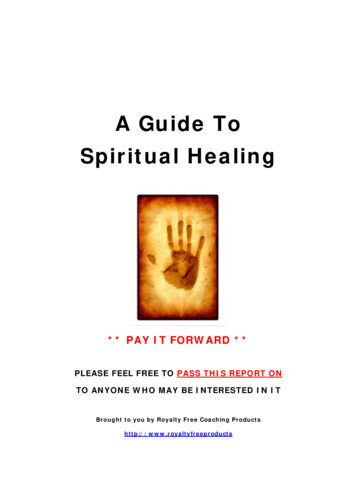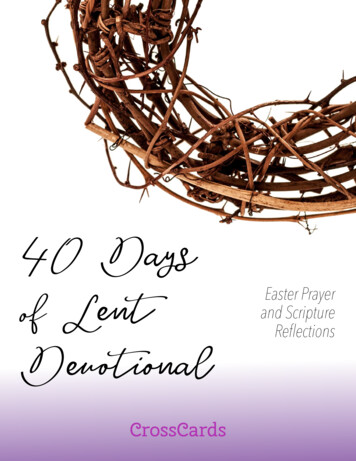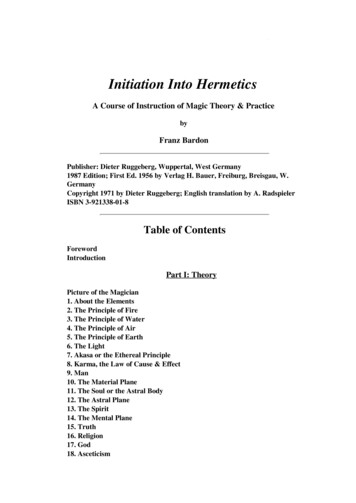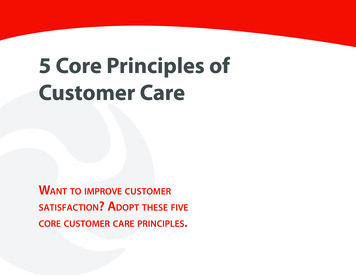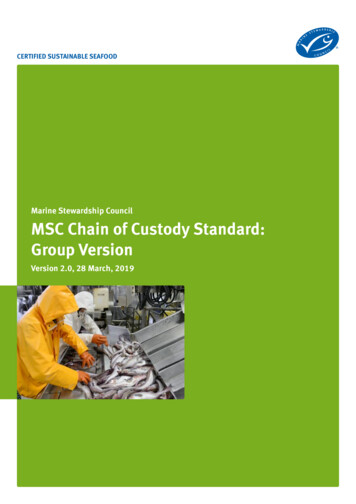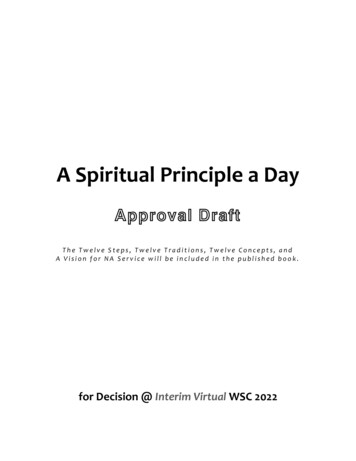
Transcription
A Spiritual Principle a DayApproval DraftThe Twelve Steps, Twelve Traditions, Twelve Concepts, andA Vision for NA Service will be included in the published book.for Decision @ Interim Virtual WSC 2022
“A Spiritual Principle a Day Approval DraftCopyright 2021 byNarcotics Anonymous World Services, Inc.All rights reservedWorld Service OfficePO Box 9999Van Nuys, CA 91409T 1/818.773.9999F 1/818.700.0700www.na.orgISBN 978-1-63380-370-111/21WSO Catalog Item No. 9146
PrefaceEach day we wake up clean affords us the opportunity to seek a life of connection toourselves, to our fellow NA members and other loved ones, to service, and to a power greaterthan ourselves. Captured within the 366 entries of this new work, A Spiritual Principle a Day,are expressions of these connections we seek. At Narcotics Anonymous meetings, atconventions, in service activities, and in our day-to-day conversations with each other, we talk alot about living by spiritual principles, sharing our experience both directly and indirectly ofwhat that means and how we do it. Our overarching goal for this project is to create a book thatwill inspire NA members all over the world and evoke thoughts about the connection betweenspiritual principles and recovery from addiction. A Spiritual Principle a Day is intended toprovide us with practical applications regarding how we strive to live spiritually in recovery,facing life on its own terms, and how we support each other in doing so. The structure of eachdaily meditation a quotation from NA literature, a brief reading, and something tocontemplate for the day offers us as individuals, meetings, groups, and sponsorship networksa starting point for reflection, discussion, sharing, or however else we choose to proceed.How A Spiritual Principle a Day Was DevelopedThe idea for A Spiritual Principle a Day came from us, the Fellowship of Narcotics Anonymous.The 2018 World Service Conference (WSC) approved a project plan for a new book to explore aspiritual principle on each day of the year. This move was based on information garnered froma 2017 survey completed by NA members from 37 countries across six continents. Ourresponses overwhelmingly indicated a desire to hear the voices of fellow members, to learnhow others apply spiritual principles in their daily lives, and to read about how living by spiritualprinciples shapes our experience.Once the mission to create this book was established by the Fellowship at the WSC, we wereleft to figure out how to accomplish the task before us. Specifically: How do we develop a pieceof literature that speaks to the range of spiritual principles that NA members practice and tothe range of how those spiritual principles are practiced in our daily lives?Like all NA literature, this book was developed by NA members for NA members. In order toreflect the experiences of our ever-evolving, worldwide Fellowship, the development processincluded as many NA members as possible as many and as diversely representative of ourFellowship as have elected to participate. Participants in the process were geographically,linguistically, and culturally diverse, as well as varied in terms of cleantime and spiritualpractices.The entries in this volume are derived from thousands of pieces of material submitted byindividual NA members, meetings, and groups, and from A Spiritual Principle a Day workshopsand activities all over the world. A workgroup composed of a diverse group of NA members was 2021 NA World Services Not for ReproductionTo purchase paper copies, visit na.org/webstoreTo download e-copies, visit na.org/conferenceiiiA Spiritual Principle a Day Approval Draftfor Decision at Interim WSC 2022
convened to deliver on the specifics of the Fellowship’s requests for the new book, to selectquotations from NA literature related to each spiritual principle, to read all of the submissionsfrom members, and to identify the elements that would be woven together to create the fabricof this book. Writers, who are also NA members, were engaged to develop and creatively refinethe entries, based on workgroup, World Board, and Fellowship review and input. Drafts of allentries, plus the preliminary list of the principles to be addressed, were posted online so thatindividual members and groups could provide feedback on the direction of the work inprogress. The entire process, from conception to production, took more than four years.These pages contain the results of this process. This is NA unity in action. The entries exemplifywhat spiritual principles mean to NA, giving practical, relatable reflections on how to applythem in our daily lives, both in and out of the rooms. Our Fellowship envisioned a well-roundedand broadly appealing book in which individual entries serve different functions inspirational,educational, heartwarming, humorous, and real. This eclectic approach means that not allentries will resonate with everyone, but it ensures that all of us will see ourselves somewhere inthis book. These are our stories, our experiences, our voices.Applying A Spiritual Principle a Day in Our RecoveryBased on the Fellowship’s recommendations, we structured A Spiritual Principle a Day as a dailymeditation book, similar to Just for Today (JFT). Each page highlights a spiritual principle with aquotation from our body of NA literature. The excerpt is followed by a meditation on theprinciple and a reflection for the day.What we do with these words on the page is entirely up to us. The choices are varied, perhapsas varied as we are. Sure, using the written intention at the end of each page to inspire ourpersonal meditation practice is an option, but it’s one of many.A Spiritual Principle a Day is a labor of love intended to meet each of us exactly where we are inthe moment when we pick up the book. We can start A Spiritual Principle a Day meeting, justlike we’ve done for Living Clean, JFT, or Guiding Principles. We can use it to start or end our daywith meditation practice or writing or prayer. We can use it to connect to our Higher Power insome way. We can share about it with sponsees to help broaden their (and our) understandingof how a particular spiritual principle is affecting our lives at any given moment. Want to focuson one spiritual principle for an entire week? Find it in the list at the back of the book, and getstarted!Some of us may find this list too long, while others will surely identify principles that shouldhave been included. Our connection to our principles will vary, just as each day’s reading willstrike us differently. Our hope is that each of us will find something in these pages that weidentify with, empathize with, strive toward, and aspire to. As we continue in our growth,individually and as a Fellowship, we can all expect to learn a lot from each other as we findcreative approaches to engage with A Spiritual Principle a Day. 2021 NA World Services Not for ReproductionTo purchase paper copies, visit na.org/webstoreTo download e-copies, visit na.org/conferenceivA Spiritual Principle a Day Approval Draftfor Decision at Interim WSC 2022
JANUARY
1 JANUARYRecapturing a Sense of WonderThe sense of wonder we experience in our own lives as if we were seeingthem for the first time brings an array of feelings.Living Clean, Chapter , “Living Our PrinciplesActive addiction is a grind, leaving most of us jaded by the time we get to NA. We stay coollydistant from other humans and much of life, hoping to avoid those pesky feelings. We thinkor say “Who cares? a little too often, even for our own taste. Cynicism and apathy hadworn away any optimism we once had. But then we get clean, and what we learn inrecovery challenges this entire mindset.Experiencing the world with a sense of wonder is one of the fringe benefits of working anNA program. Some of us stumble on a new positivity when we start stringing together daysclean. Others warm up to a new way of responding to the world over time or encounterwonder in sporadic bursts. But, regardless of the timeline or intensity, we recognize thatfeeling of awed respect and the newfound appreciation it brings.When we find ourselves thinking or saying “Wow! it’s a good indication that we’reexperiencing a sense of wonder. “Wow! is a prayer unto itself in the minds of some NAmembers. It captures what it means to embrace wonder as a spiritual principle, completewith awe, connection, impact, and reverence in the space of three letters.Nature is kind of a show-off when it comes to inspiring wonder. Of course, we don’t have totravel far to be wowed by a sunrise or sunset. But beyond nature and perhaps moreimportantly for us in recovery we find a sense of wonder in everyday life if we’re open toit and paying attention. Moments of clarity the clean kind allow us to see our lives anew.Each time we take a moment to appreciate our growth, admire what’s right with us and theworld, delight in new insights, or feel all our feelings is an invitation to practice wonder.I will challenge myself to look at life and recovery with curiosity and enjoy asense of wonder wherever I may find it. 2021 NA World Services Not for ReproductionTo purchase paper copies, visit na.org/webstoreTo download e-copies, visit na.org/conference2A Spiritual Principle a Day Approval Draftfor Decision at Interim WSC 2022
2 JANUARYUnity Keeps Us Coming BackWhen we walk into our first meeting and see addicts coming together inunity, the spirit touches us even before the words get through.Guiding Principles, Tradition One, “Spiritual PrinciplesThat first meeting. Some of us arrive beaten down, asking for help. Others of us show upbecause we need that paper signed. Still others come to prove a point to someone else orto ourselves like maybe we don’t need a program, and showing up at a meeting willsomehow prove that point. We enter not knowing what to expect, and try to stay on thesidelines, unnoticed. People are chatting, putting out literature, setting up the room, beingtogether. Someone gives us a hug to be welcoming, not for any other reason. Cultureshock!Our First Tradition tells us that “personal recovery depends on NA unity. We may not fullygrasp this concept at first, but even so, unity takes hold of us. Somehow, we sense that wejust might belong here. We take up the suggestion we hear at every meeting: We keepcoming back. Some of us return to hear more of what members shared or read. For others,the togetherness we witness gets us to that next meeting. We watch as members embraceand let go enough to accept the hugs we’re offered. We sense that we are part ofsomething greater than ourselves and our addiction. We let go just a little. Despite ourinitial skepticism and discomfort, the spirit of unity encourages us to stay.Later, we attend our first NA convention, where we experience this spirit on a much largerscale. We come together to celebrate recovery, and unity springs from our sharedcommitment to living clean. Truly, we have found a new way to live. In unity, we reach outto newcomers and show them how we recover together.Today I will celebrate the spirit of unity that keeps me coming back byoffering my support to a newer member. 2021 NA World Services Not for ReproductionTo purchase paper copies, visit na.org/webstoreTo download e-copies, visit na.org/conference3A Spiritual Principle a Day Approval Draftfor Decision at Interim WSC 2022
3 JANUARYComing to Accept OurselvesOacce a ce a dHighe P epossible for us to judge ourselves less harshly.cdi iaeade iIt Works, Step TwelveNo one comes to NA on a winning streak. Denial had helped us ignore the wreckage, butthose days are long gone. Our minds no longer reassure us: Ye i i g he d eaespecially considering the loha de bee deaIn early recovery we may experience rare glimpses of self-acceptance, but the mentalbeatings we give ourselves keep that optimism in check. We are undoubtedly our harshestcritics. That’s especially true when we make mistakes: not showing up for a friend in need,unintentionally making another member uncomfortable, blowing off a commitment, usingagain. Even for members in long-term recovery, our disease continues to urge us to judgeourselves. Not being real about our mistakes and overindulging in self-pity or selfdestructiveness runs counter to accepting ourselves as works in progress.One member recalled, “Through his steady encouragement in the face of my self-madedisasters, my sponsor showed me unconditional love and helped me be open to how aHigher Power was expressing it in my life. As my recovery continued, the chaos lessened butthe temptation to beat myself up remained. Sharing the exact nature of my wrongs in StepFive and still being accepted unconditionally helped me unclench my fists a littlequicker.Sponsors tell us the truth about ourselves. Inevitably, that truth is more loving, forgiving,and accepting than our version of things. Working the Steps with our sponsor teaches us tofind that truth for ourselves. Through the practice of prayer and meditation, we can checkin with a Higher Power to guide us toward what is real about ourselves, our decisions, ourmistakes rather than relying on what our minds tell us.I eicahegeIbeaa ea 2021 NA World Services Not for ReproductionTo purchase paper copies, visit na.org/webstoreTo download e-copies, visit na.org/conferenceefeda I ead IihHighe P4iche h e a de a d ge eaA Spiritual Principle a Day Approval Draftfor Decision at Interim WSC 2022
4 JANUARYThe Gift of AttentionHearing addicts share their experience, seeing recovery in action, feeling thelove in the room all this is as much a part of the process as the work we doon the Steps.Guiding Principles, Tradition Eleven, Opening EssayThe “attraction, rather than promotion that’s evident in the rooms of NarcoticsAnonymous is often what keeps us coming back in early recovery. If we smelled promotion,it would be a major turnoff. Many of us may start out skeptical, but desperation forces us topay close attention. At first, the Steps, as read in “How It Works at many meetings, maynot resonate they’re not what we had in mind as our solution. But the stories we hear, thewarmth we experience, takes hold.Witnessing recovering addicts being their full selves is remarkable and absorbing, and itkeeps us coming back. Someone identifies themselves as brand-new “This is my firstmeeting ever and receives a genuine, hospitable welcome. A member celebrates twoyears clean, made so precious by the fact that it took way longer than that for them toreach this milestone. Another shares their story of losing connection to NA due to familyresponsibilities and then rekindling their bond to the Fellowship, thanks to members stayingin touch. Others speak about their addictive relationship with food, sex, or money, andabout illness, loss, or lapses in judgment that have ugly consequences. And many others talkhonestly about their struggles with stuff we can’t control: a psycho first date, a mean boss,traffic, and the weather.We are paying attention to all these stories, their unique threads and common messagesand their shared solutions often found in the Twelve Steps. When we work the Steps to thebest of our ability, they help us undergo the profound change that allows us to stay cleanand more free from the self-centered fear that can bog us down. But that’s never todiscount the importance of all the hard-won experience and wisdom we pick up from othermembers. Recovery isn’t just what happens on our own with our stepwork. It’s what wehear, see, and feel from each other. It’s all of the elements of the program in concert.Yes, I am commi edheic ai ed i he S e Ipay attention to my fellow addicts and enrich my recovery. 2021 NA World Services Not for ReproductionTo purchase paper copies, visit na.org/webstoreTo download e-copies, visit na.org/conference5ahe eA Spiritual Principle a Day Approval Draftfor Decision at Interim WSC 2022
5 JANUARYSeeking Connection Instead of DistractionWe try to minimize distractions so that we can concentrate on knowledgearising from our own spiritual connection.NA Step Working Guides, Step Eleven, “Prayer and MeditationDistractions are tricky: The more we try to get rid of them, the more power they seem togain. As an example, if we spend the entire meeting thinking about not taking our phoneout, we probably hear just as little of what is shared as if we’d had the phone out the wholetime. Worse yet, if we put all of our energy into thinking about other people on theirphones, how well are we really listening? As with our connection to the meetings weattend, we improve conscious contact with a Higher Power when we focus on the contact,rather than the distractions.We all have plenty of distraction techniques that give us ways to avoid being present in thecurrent moment. Maybe we stare at a screen for long stretches to distract us from beingsad or angry or bored. Maybe we get pulled out of our meditation by hearing the neighbor’sdog bark its head off or the trash truck thundering down the street or . . . air moving. Nomatter what the source of distraction, internal or external, real or imagined, distractionsinterfere with our conscious contact with ourselves, each other, and our Higher Power.How do we focus on maintaining our connection? In a meeting, it’s as simple as listeningclosely to what is being shared. If our mind drifts to the phone in our pocket (or the one insomeone else’s hand , we simply bring our attention back to the person who is sharing. Inmeditation, we simply listen for “whatever’s there. If we catch our mind drifting, we simplybring our attention back to the present moment. By focusing on where we are in themoment, we can resume our connection with our Higher Power. We listen, we share, andwe often find that we already have exactly what we need.Listening and sharing well in meetings can help me better listen and sharewith my Higher Power. If my mind drifts away from conscious contact, Id ehe di ac iI will simply shift my attention back to themoment I am sharing with my Higher Power. 2021 NA World Services Not for ReproductionTo purchase paper copies, visit na.org/webstoreTo download e-copies, visit na.org/conference6A Spiritual Principle a Day Approval Draftfor Decision at Interim WSC 2022
6 JANUARYVigilance and the Second TraditionWe need to keep an eye on our passion, lest it become self-righteousness;and we keep an eye on our disagreements, lest we begin to harbor ill willtoward our fellows. Vigilance is an inside job.Guiding Principles, Tradition Two, “In ServiceThe practice of vigilance can be like holding vigil: keeping space and silence to honorsomething of value, such as the spiritual principles that bring us freedom and peace ofmind. In our personal recovery, vigilance often means paying close attention to our feelings,thoughts, and actions so we can catch ourselves before slipping into old behaviors orpatterns. Our Basic Text reminds us that “we are each other’s eyes and ears. Our sponsorand other NA members can hold vigil with us by reflecting our values to us when we forgetthem or pointing out our bone-headed actions when we fail to see them. We need oneanother’s vigilance.Our vigilance has a place in NA service, too. We strive always to adhere to the guidance ofour Traditions, working to maintain unity, anonymity, focus on our primary purpose, and soforth. Many of us have gone through a phase or phases in our service to NA when wefelt as though the Traditions needed enforcers, and we were just the right candidates. Onemember shared, “I had been calling the local helpline and pretending to be a using addict tosee if I could catch the volunteers making a mistake. Then my sponsor asked me which listof spiritual principles I found ‘deception’ in. I felt pretty embarrassed.Our Traditions guide us to do our best for NA, and we each have a responsibility to remainvigilant and speak our conscience. Sometimes, those who disagree may treat us likevigilantes people who take matters into their own hands. Other times, we might feel likevigilantes like NA won’t survive if we don’t save it. Tradition Two reminds us to trust theexpression of a Higher Power in our group conscience. NA is a we thing, not a me thingrather than enforcing our Traditions or trying to catch our fellow members slipping, wespeak our conscience clearly and directly and leave the results up to a power greater thanourselves.I can be vigilant without becoming a vigilante; my perspectives andinterpretations are one of many. I will give my fellow members somethingwe all deserve: room to make mistakes and room to learn from them andgrow. 2021 NA World Services Not for ReproductionTo purchase paper copies, visit na.org/webstoreTo download e-copies, visit na.org/conference7A Spiritual Principle a Day Approval Draftfor Decision at Interim WSC 2022
7 JANUARYFaith in the Program and Each OtherFai h i hareason.eed i g he fe ehee caee heLiving Clean, Chapter , “Growing PainsMany of us were fine with living a philosophy of “act now, ask questions later in ouraddiction. We did what we had to do the footwork of using, perhaps and had a certaindegree of faith within the chaos of that lifestyle. But we don’t necessarily bring those boldtactics into early recovery. Why then is it so difficult for many of us to have faith and get onboard with NA from day one? Maybe it’s that we didn’t know what we wanted. We thoughtwe’d found what we wanted in drugs, but total abstinence seemed unlikely and long-termrecovery unfathomable. Yes, we want a better life, but who doesn’t?It’s suggested we go to meetings. Help set up the room. Read the book. Call a memberwhen we’re feeling squirrelly. Ask someone to be our sponsor so they can take us throughthose unfathomable Twelve Steps. We also think, Thifbha if i d efor me? And why do you seem so sure it will?A lot of us would say the reasons are evident. Here are a bunch of addicts who didn’t usetoday, who set up and ran a meeting that started and ended on time. They shared theirexperience, strength, and hope. They griped about their day but stayed clean anyway. Theywere joyful with each other, celebrating recovery milestones with gratitude. Whenspeaking, most expressed their faith in the program and in each other.At some point, we made a decision to do the footwork without a clear picture of ourdestination. Why? Some of us are so desperate we’ll do anything to stop the pain. Forothers, it’s a lightning-bolt spiritual awakening, a moment of clarity. Some of us take tinysteps or have many moments of clarity. Others find a single person to trust, and that drivesour decision. Still others cling to our rebelliousness and then find ourselves celebrating ayear clean, then five years, then a quarter-century. No matter what kicks it off, this decisionis, for many of us, our first experience of faith. We hear that more will be revealed, andmore is.I see abundant evidence around me that NA works. I just need a bit of faithevery day to keep me willing to follow my path of recovery. 2021 NA World Services Not for ReproductionTo purchase paper copies, visit na.org/webstoreTo download e-copies, visit na.org/conference8A Spiritual Principle a Day Approval Draftfor Decision at Interim WSC 2022
8 JANUARYFacing Our ResponsibilitiesWe can no longer blame people, places, and things for our addiction. Wemust face our problems and our feelings.Basic Text, Chapter 3: Why Are We Here?When we were using, denial shielded us from recognizing the part we played in our owndestruction. We blamed our circumstances or the people around us for our drug use. Everyonce in a while, some light would shine through the cracks in our denial. A quiet voicewithin us said, “If you keep doing what you’re doing, you’re going to keep getting whatyou’re getting. By the time we stumbled into the rooms of NA, self-deception was oftensecond nature. We may have been so used to blaming others that it took work for us tospot this mindset and still more work for us to fully appreciate its implications.Personal inventories help us understand our distorted sense of reality. We decipher “ourpart no more, no less and take responsibility for it. Yes, we may have been intentionallyhurtful at times. Just as often, though, our intentions were good, or at least very human.We attempted to wrestle some sense of security and significance from an uncertain world,we put ourselves in a position to be hurt, or we clung to others in hopes that they mightsave us from ourselves. Understanding the patterns in our thinking and behavior helps usrecognize them when they crop up again, as they often do.Some of us are survivors of unspeakable trauma. We have real emotional wounds caused bywartime combat, physical or sexual assault, natural disasters, or extreme poverty. We arenot at fault for these horrific experiences. We find ways to reckon with our trauma in ourown time and often with help from resources outside NA. Our responsibility begins whenthe Steps uncover a need for more work. Real healing takes courage and persistence.Recovery gives us the opportunity to know ourselves, to answer to our own conscience, andto own our part instead of blaming forces outside ourselves. We take responsibility andreap the rewards that come from being accountable for our actions: We’re capable offeeling the whole range of human emotions and ready to face life on life’s terms.I will not hide behind the disease of addiction today, nor will I cast blame onothers in my orbit. I will practice responsibility by accepting my part in theproblem and my role in the solution. 2021 NA World Services Not for ReproductionTo purchase paper copies, visit na.org/webstoreTo download e-copies, visit na.org/conference9A Spiritual Principle a Day Approval Draftfor Decision at Interim WSC 2022
9 JANUARYParticipation, Service, and the Seventh TraditionAs a member of an NA group, we take part in developing a conscience abouthow the group will meet its responsibilities and participate in the life of thelarger Fellowship.Guiding Principles, Tradition Seven, “For MembersWho among us hasn’t felt like a victim of our circumstances at some point? In activeaddiction, we may have made an art form of blaming outside forces for our problems. It’strue that some situations beyond our control cause undue hardships or difficulties, but wehave choices available to us now. Recovery teaches us to actively participate in a solution,beginning with taking personal responsibility for our actions and participating in theprogram of NA.We also take responsibility for the Fellowship by participating in the discussions anddecisions affecting our groups and service bodies. Each of us has to determine forourselves in consultation with our Higher Power and our sponsor what level ofparticipation feels right for us. “I noticed that when I participate less and have lessinformation, a member recalled, “the more I think in terms of ‘us’ versus ‘them.’ When Istep up my participation, I feel like it’s all ‘us.’ There’s a reason we often talk about serviceas part of Tradition Seven, not just the money we give. When we give our time throughactive participation, we are practicing a form of self-support. According to one addict,“Recovery is not a spectator sport. We get out of it what we put into it.The practice of participation we learn in NA tends to show up in other areas, too. In ourfamilies, in our work the more we participate, the more we feel that we are part of, ourvoices matter, and our needs are considered. We are not just victims of circumstanceanymore; we actively participate in solutions.When I passively observe life, service, and rec emyself. Today I will show up and participate. 2021 NA World Services Not for ReproductionTo purchase paper copies, visit na.org/webstoreTo download e-copies, visit na.org/conference10Ih-changingA Spiritual Principle a Day Approval Draftfor Decision at Interim WSC 2022
10 JANUARYWaking Up to ServiceBeing of loving service is living spiritually. First we take, then we give, thenwe share.Living Clean, Chapter , “Creative Action of the SpiritIn Narcotics Anonymous, we arrive to find ourselves the most important person in theroom. For a lot of us, that notion is terrifying, but some of us enjoy the rock-star treatment.We grab a white keytag and do a victory lap for thirty days in a row including weekends.We share in every meeting until the timer goes off (every time), wondering aloud what thehell we are doing here with “all you people . . . no offense. We dazzle our fellows with ourtheory of the difference between humility and humiliation. They must like what we have tosay, ’cause they tell us, “Keep coming back. We find a sponsor and bend his ear with adetailed account. “Sponse picks us up at the recovery house and buys us a meal after themeeting. He doesn’t say much, but he’s definitely listening!As our status as the most important person melts away and our keytag color changes toorange, Sponse suggests we listen more instead of talking so much, take meetingcommitments that don’t court attention, and reach out to newcomers. We get a blue sixmonths clean, and we ask our sponsor about doing H I. “Good idea is his response. Wethink he’s pleased about our initiative, even though he says nothing about it. Our bravadoshifts. We get some high-fives and tighter hugs from members who acknowledge how wellwe’re doing. That feels undeniably good, but showing up for other addicts feels even better.Our story continues. We glow in the dark at one year and are black-and-gold at two. Ourcommitment to service deepens. We are invited to participate in our recovery, to share ourexperience, strength, and hope. We start to have this strange new feeling that we can’tquite put our finger on. Over dinner on us this time we try to articulate the feeling to oursponsor: “It’s something about being of value, maybe a little gratitude thrown in . . . ? Westruggle to find the words.“Hmm, says our sponsor. “Sounds like you might be wa
The idea for A Spiritual Principle a Day came from us, the Fellowship of Narcotics Anonymous. The 2018 World Service Conference (WSC) approved a project plan for a new book to explore a . this book was developed by NA members for NA members. In order to reflect the experiences of our ever-evolving, worldwide Fellowship, the development .


![Welcome [dashdiet.me]](/img/17/30-day-weight-loss-journal.jpg)
